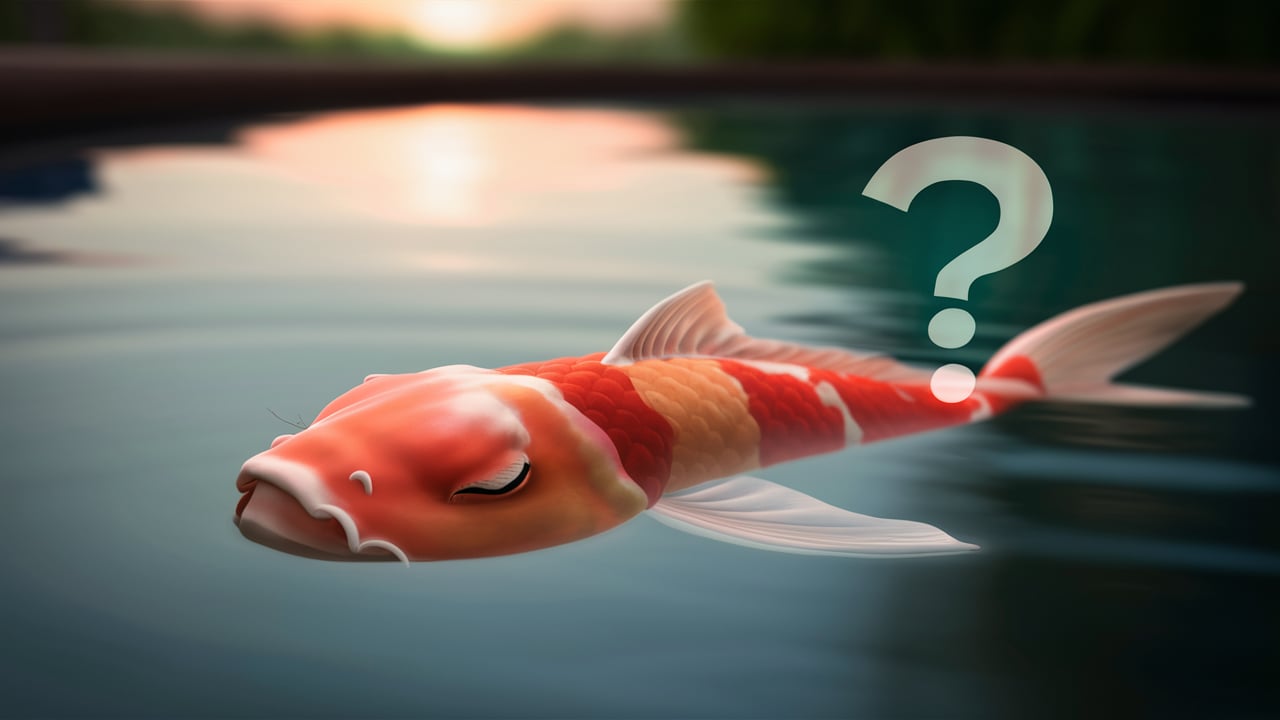Do Koi Fissh Sleep? The answer, surprisingly, is yes! While their slumber may differ from our own, koi fish do indeed enter a state of rest. Koi Fish Tips is here to guide you through the fascinating world of koi fish sleep, exploring the science behind it, how it differs from human sleep, and the factors that influence their sleep patterns.
Do Koi Fish Sleep?
Koi fish, like all living creatures, need rest to replenish their energy and maintain their well-being. However, their sleep differs significantly from human sleep. Instead of entering a deep, unconscious state, koi fish experience a period of reduced activity and heightened awareness. This state, known as “resting” or “inactive period”, is characterized by:
- Reduced Movement: Koi fish will slow down their movements and spend more time resting on the bottom of the pond or near the surface.
- Diminished Metabolism: Their metabolic rate slows down, leading to a decrease in their energy consumption.
- Increased Sensitivity: They remain alert to their surroundings and can quickly respond to any potential threats.
When Do Koi Fish Sleep?
Koi fish sleep patterns are influenced by several factors, including:
Light Cycle
Like many other species, koi fish are sensitive to light. They tend to be more active during daylight hours and enter their resting period at night. This is particularly true during the summer months when there are longer periods of daylight.

Temperature
Water temperature plays a significant role in koi fish activity. During colder months, their metabolism slows down, and they may spend more time resting.
Food Intake
Koi fish that have recently eaten tend to be more active, while those that have not eaten recently may be more likely to rest.
Stress Levels
Stressful conditions, such as overcrowding or poor water quality, can disrupt their sleep patterns.
How to Tell If Your Koi Fish Are Sleeping?
While koi fish don’t close their eyes or exhibit the same physical signs of sleep as humans, you can observe certain behaviors that indicate they are resting:
- Reduced Movement: They will move less frequently and spend more time in a stationary position.
- Slowed Breathing: Their breathing rate will slow down.
- Diminished Appetite: They may eat less frequently or not at all during their resting period.
The Importance of Sleep for Koi Fish
Sleep is crucial for koi fish health and well-being. It allows them to:
- Conserve Energy: Resting helps them conserve energy, which is essential for growth and reproduction.
- Repair and Regenerate: Sleep allows their bodies to repair and regenerate tissues, ensuring optimal physical function.
- Maintain Immune System: Adequate sleep strengthens their immune system, making them less susceptible to diseases.
Factors Affecting Koi Fish Sleep
Several factors can affect the quality and duration of fish sleep:
Water Quality
Poor water quality, such as high levels of ammonia or nitrates, can stress koi fish and disrupt their sleep patterns.
Pond Size
Overcrowding can lead to competition for resources and increased stress, negatively impacting their sleep.
Predator Presence
The presence of predators can keep koi fish on high alert, preventing them from entering a restful state.
Noise and Vibration
Excessive noise and vibrations can disturb their sleep and cause stress.
Ensuring Your Koi Fish Get Enough Sleep
Creating a comfortable and safe environment for your koi fish is essential for their sleep:
- Maintain Water Quality: Regularly test and maintain optimal water parameters, including pH, ammonia, and nitrates.
- Provide Adequate Space: Ensure your pond is large enough to accommodate your koi fish without overcrowding.
- Minimize Stress: Avoid introducing new fish or performing maintenance during their resting period.
- Create a Quiet Environment: Minimize noise and vibrations near the pond, especially at night.
- Provide Shade: Offer shaded areas in the pond where koi fish can rest during the day.
Frequently Asked Questions
Do fish sleep in the winter?
Yes, koi fish become less active during the winter months due to colder water temperatures. They may enter a state of torpor, a period of inactivity and slowed metabolism.
Do fish sleep in groups?
While they may rest in close proximity to each other, koi fish do not sleep in groups in the same way that some other species do.
How long do koi sleep?
The duration of their resting period can vary depending on factors like temperature, light levels, and stress levels. However, they typically enter a state of reduced activity for several hours each night.
Can I wake up my koi?
It’s best to avoid disturbing your koi fish during their resting period. Sudden movements or loud noises can stress them and disrupt their sleep.
Conclusion
Koi fish, despite their vibrant personalities and energetic movements, do require rest. Understanding their sleep patterns and creating a comfortable environment for them is crucial for their overall health and well-being. By providing them with a safe and peaceful space, you can ensure they get the rest they need to thrive in your water garden.

Bài viết liên quan
Baby Koi Fish – A Journey Of Growth And Beauty
Imagine a tiny, shimmering speck of color darting through the water, a miniature version of [...]
Jul
Best Food For Koi Fish: What To Feed And What To Avoid
Koi fish, with their vibrant colors and elegant movements, are a captivating addition to any [...]
Jul
Do Koi Fish Eat Bread? The Truth About Feeding Your Fish
Do koi fish eat bread? Is it a suitable food for koi? This comprehensive guide, [...]
Jul